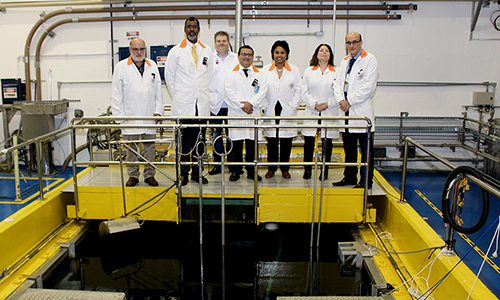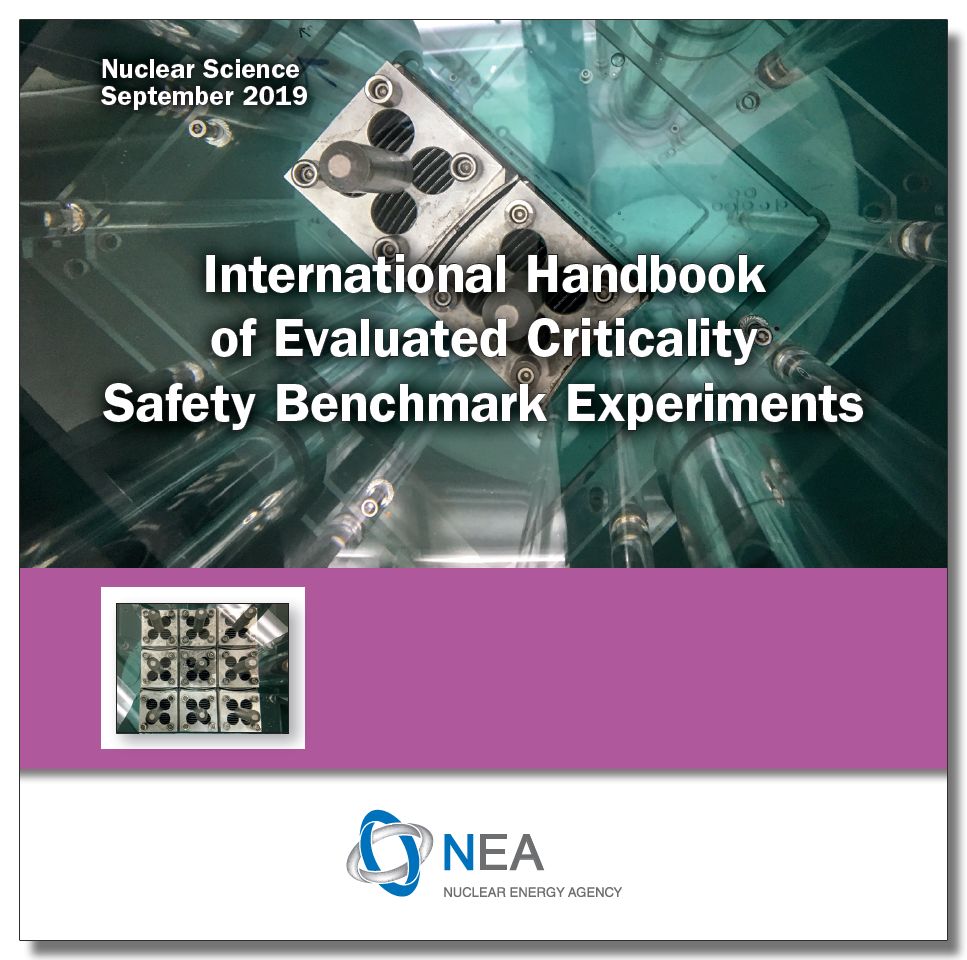Feature
The Nuclear Energy Agency (NEA)
The Nuclear Energy Agency (NEA) is a specialised agency within the Organisation for Economic Co-operation and Development (OECD), an intergovernmental organisation of industrialised countries, based in Paris, France. More »
Press releases and news
2019 Year-in-Review
2019 was a very active and impactful year at the NEA. During this year, the NEA released flagship reports on the system costs of electricity, the supply of medical radioisotopes and the long-term operation of nuclear power reactors. It organised conferences and workshops corresponding to the needs of member countries in the application and exploration of nuclear science and technology, including the country-specific nuclear safety culture forum in Finland and the first Global Forum on Innovation for the Future of Nuclear Energy. The Agency also continued its efforts in enhancing international co-operation with events such as the first Roundtable for International Co‑operation in Final Disposal of High‑level Radioactive Waste and Spent Fuel. Watch our year‑in‑review video here to see the highlights and key moments of 2019.
 Nuclear and Social Science Nexus: Challenges and Opportunities for Speaking Across the Disciplinary Divide
Nuclear and Social Science Nexus: Challenges and Opportunities for Speaking Across the Disciplinary Divide
The NEA organised a workshop on the "Nuclear and Social Science Nexus: Challenges and Opportunities for Speaking Across the Disciplinary Divide" on 12‑13 December 2019. The first‑of‑its‑kind event brought together over 100 participants, including social science and humanities researchers, academic nuclear engineers, practitioners and policy makers. The participants examined the current scope of research in the social sciences with a focus on nuclear energy, and identified ways of transforming research findings into recommendations for practice. The two‑day workshop aimed to build intellectual bridges across the nuclear and social sciences, as well as the academic and practitioner divides. Selected papers from the workshop will be published in a forthcoming special issue of the nuclear engineering journal Nuclear Technology. Workshop participants expressed a keen interest in developing inter- and transdisciplinary research collaborations and continuing their dialogue beyond the workshop. The NEA will work to identify opportunities for such collaborations in the coming months.
 Exploratory Meeting on Improving the Gender Balance in Nuclear Energy
Exploratory Meeting on Improving the Gender Balance in Nuclear Energy
As is the case for many areas of science and technology, women are significantly under-represented in technical and leadership positions in the nuclear sector. This lack of gender diversity may have substantial impacts on the future of nuclear energy in NEA member countries and certainly represents a loss of needed talent when the workforce is aging and many experts are nearing retirement. Attracting, recruiting and retaining women in science and technology, as well as enhancing the conditions and prospects for women and girls at every stage of their education and careers, is a challenge for which the NEA supports its member countries. In pursuit of these efforts, the NEA convened this week an "Exploratory Meeting on Improving the Gender Balance in Nuclear Energy".
The event brought together experts and professionals representing ministries, regulators, TSOs, international organizations from 12 NEA member countries. The participants exchanged information regarding the status of women in the nuclear sectors in their home countries and discussed what practical steps might be taken to address the challenges related to the participation of women in nuclear energy activities. They discussed short-term efforts to increase the number of women advancing to leadership positions, as well as long-term strategies to increase and accelerate the participation of women in nuclear field. During his remarks, Director‑General Magwood highlighted NEA initiatives such as NEA Mentoring Workshops and Global Panel of Universities. "We, at the NEA, believe the time is right to support our members by increasing the prominence of gender balance within national and global policy agendas, and finding paths to take substantive action," he said.
 New report and webinar on the supply of medical radioisotopes
New report and webinar on the supply of medical radioisotopes
The NEA hosted a webinar on 18 November 2019 to present findings from a new report on the supply of medical radioisotopes, jointly produced with the Organisation for Economic Co-operation and Development (OECD) Health Committee. Technetium-99m (Tc-99m) is the most commonly used medical radioisotope, essential for 85% of the nuclear medicine diagnostic scans performed worldwide. There are no comparable substitutes available for diagnoses of various cancers and for a range of diagnostics in children. Unfortunately, the global supply of Tc-99m is not technically and economically robust, and the existing supply-chain continues to experience chronic shortages. This new study analyses the current market structure and identifies barriers for the implementation of full cost recovery. If you missed the event, download the report and watch the webinar recording here: oe.cd/nea-med-rad-webinar-2019.
 NEA Director-General visits Brazil to discuss further enhancements to co-operation
NEA Director-General visits Brazil to discuss further enhancements to co-operation
NEA Director‑General Mr William D. Magwood, IV and senior staff visited Brazil on 4‑8 November 2019 for a series of meetings with various ministries and institutions, the Ministry of Mines and Energy (MME), the Ministry of Science, Technology, Innovation and Communication (MCTIC), the Ministry of Foreign Affairs (MRE), the Institutional Security Cabinet, and the National Nuclear Energy Commission (CNEN). Technical visits were also made to the Angra Nuclear Power Plant, the Nuclear and Energy Research Institute (IPEN), and the São Paulo Naval Technology Centre (CTMSP). While in Brazil, Director‑General Magwood gave a lecture on the current state and future prospects for nuclear energy to students and faculty at the University of São Paulo. The Director‑General's visit to Brazil was an excellent opportunity to exchange views on nuclear power, education and research, as well as on how to continue strengthening the NEA's engagement with Brazilian entities.
 International criticality safety benchmark evaluation project (ICSBEP)
International criticality safety benchmark evaluation project (ICSBEP)
The 2019 edition of the International Handbook of Evaluated Criticality Safety Benchmark Experiments contains criticality safety benchmark specifications that have been derived from experiments performed at various critical facilities around the world. It presents evaluated criticality safety benchmark data in nine volumes that span over 70 000 pages. The handbook contains 574 evaluations with benchmark specifications for 4 973 critical, near‑critical or subcritical configurations, 45 criticality alarm placement/shielding configurations with multiple dose points for each, and 237 configurations that have been categorised as fundamental physics measurements that are relevant to criticality safety applications. Requests to obtain the DVD or online access should be made by completing the online form.
New publications and reports
Country-Specific
Safety Culture Forum: Finland
Read the report
Legal Frameworks
for Long-Term
Operation of Nuclear
Power Reactors
Read the report
The Supply of Medical Radioisotopes: An Economic Diagnosis and Possible Solutions
Read the report
Insights from Leaders
in Nuclear Energy 2:
Leadership for Safety
Read the issue
 What is the NEA?
What is the NEA?
